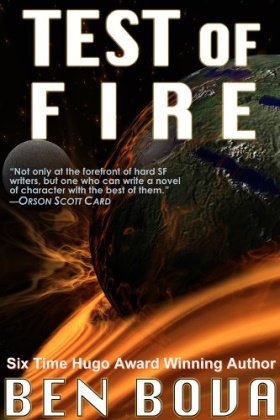“Why did you lie to me?” she asked, her tone more hurt than angry. “Was it just to screw me or to get the radio? Which one?”
“I wasn’t lying,” he said. Before she could reply, he added, “I didn’t tell you the whole truth... but I wasn’t lying when I said I want you to come back to the Moon with me.”
Angela’s frown softened, but her eyes were still wary, searching. “You mean, after you’ve taken the uranium.”
He nodded.
“You knew that wasn’t what I meant when I offered to get you to the power supply.”
“Yes, I knew.”
“Then you were lying to me.”
“And so were you,” he countered, “when you offered to help me. You knew you were going to call Douglas and trap me.”
“I know you’ll have to kill him before you can get your hands on the fissionables.”
“And you’re protecting him.”
“I’m trying to protect both of you,” she said earnestly, urgently.
“And that’s why you lied to me.”
She almost smiled. “All right, I lied too. Feel better?”
“Yes.” It was almost funny. They had both been sneaking around each other.
“But he needs you, Alec. What he’s trying to do...”
He stiffened. “Douglas? He doesn’t need anybody. He’s got enough ego to cover the world all by himself.”
“And you’re blind!” she snapped.
Douglas’ base was a shock. They drove up to a well-maintained wire mesh fence that seemed to wind clear across the landscape, over the rolling hills and as far as the eye could see. Where the road penetrated the fence stood a sentry tower, wooden beams weathered by sun and rain. Two men lounging at the base of the tower straightened the guns on their shoulders and opened the gate wide enough for one of them to step through. Douglas brought the jeep to a full halt and exchanged a few words with him.
They swung the gate wide. Alec saw that there were at least two more men up at the top of the tower. The grim snout of a heavy machine gun poked out over the railing up there.
After another chilly fifteen minutes of driving, with nothing to be seen but open countryside, they came to the first buildings.
“This used to be a base for the United States Air Force,” Douglas called back from the driver’s seat. “Makes an ideal headquarters for us—ready made. They used to call this area Rome. Appropriate name, don’t you think?” He laughed; Alec did not.
They drove past row after row of neat wooden buildings, most of them looking as if they had been freshly painted. Barracks, machine shops, warehouses, mess halls, even a building marked BASE THEATER in barely readable faded lettering. The airfield itself was immense, huge swaths of concrete runways and ramps, hangars and maintenance buildings and office towers built of brick and stone. All in excellent condition. But not an aircraft in sight.
“The missile assigned to this base must’ve missed its target or been shot down,” Douglas said. “It went untouched.”
We could land the shuttles right here, Alec was thinking.
People were everywhere. Throngs of people, more than Alec had ever seen in his life. Walking, working, laughing; many of them waved to Douglas as he drove past. Hardly any of them carried weapons. Like the history tapes of the old cities, Alec saw.
They drove past the airfield, out to a more deserted sector of little knolls topped by small clumps of vividly colored trees. No buildings in sight out here, except one solitary concrete blockhouse standing on a bare grassy hill. Douglas drove straight to the blockhouse.
“This is where the fissionables are,” he said, turning in the too-small bucket seat to face Alec. “Want to see ‘em?”
Alec supressed an impulse to lick his lips. “Yes.”
Douglas hauled himself out of the jeep and headed for the blockhouse door. The guard stepped out of his seat and turned toward Alec. He slid the pistol back into its holster, but kept his hand on its butt. Alec climbed out and turned to help Angela, but she had already jumped out on the other side.
Douglas had the heavy metal door open already, and Alec frowned inwardly at the realization that he hadn’t seen if it had been locked or not. Doesn’t matter, he told himself. We can blow it open if we have to.
Inside, the blockhouse was musty and damp. It was a small room, completely empty and dark except for the light sneaking in through the gun slits in each wall.
“Eh, would you mind?” Douglas gestured toward a metal trapdoor set into the cement floor. “I can’t bend as easily as you can.”
Alec reached down and grabbed at the metal catch at one end of the steel door. He tugged, then heaved. Nothing.
“It slides,” Douglas said.
“Thanks for telling me before I ruptured myself.” The door slid back smoothly. It’s been oiled recently, Alec realized.
They clattered down a long metal stairway into utter darkness, groping along the wall and railing until Douglas said, “Wait a minute... the generator switch should be... here...”
A click, and then from somewhere in the darkness below them a rumble and whine from a diesel generator set. Alec smelled a whiff of machine oil. Then lights glowed into life.
He could see that the stairs went down another twenty meters and ended in a huge storehouse room. Spread across the floor were heavy, dull-gray metal cylinders, each bearing the blood-red three-sided emblem of danger and the printed words RADIOACTIVE MATERIAL. There were dozens of the cylinders, Alec saw, scores of them. A hundred, maybe more.
Enough to power the processing plants for a century, at least.

























